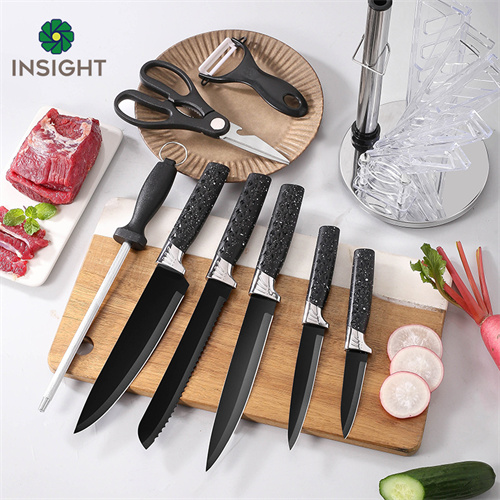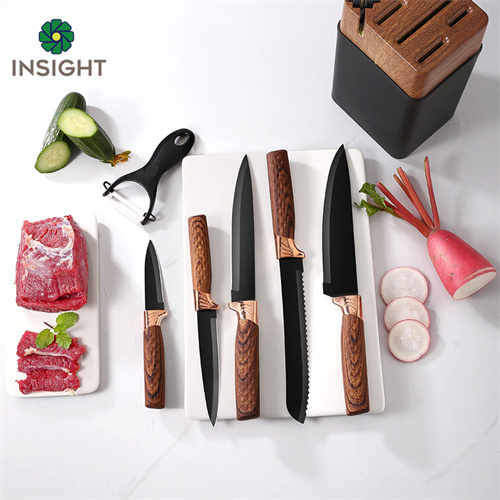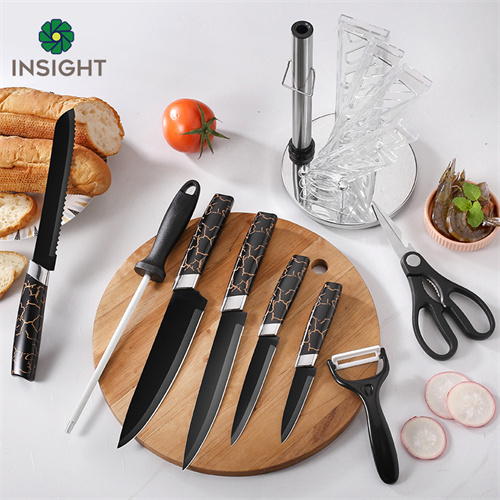

Views: 900 Author: sales@insightknife.com.cn Publish Time: 2025-02-06 Origin: Site








Content Menu
● Understanding Kitchen Shears
>> Dull Blades
>>> Solutions
>>> Causes of Rust
>>> Solutions
>>> Causes of Food Debris Buildup
>>> Solutions
>> Loose Screws
>>> Solutions
>> Improper Use
>>> Common Misuses
>>> Solutions
>> Safe Storage
● Frequently Asked Questions regarding Kitchen Shears
>> 1. How often should I sharpen my kitchen shears?
>> 2. Can I wash kitchen shears in the dishwasher?
>> 3. What type of oil should I use to prevent rust on kitchen shears?
>> 4. How can I remove stubborn food debris from the pivot area of my shears?
>> 5. What should I do if my kitchen shears are rusted?
Kitchen shears are essential tools in any kitchen, providing versatility for various tasks such as cutting herbs, opening packages, and even trimming meat. However, like any kitchen tool, they require proper maintenance to ensure they function effectively and last for years. This article explores common maintenance issues associated with kitchen shears, offering insights into how to address these problems and keep your shears in optimal condition.
Kitchen shears are specialized scissors designed for culinary tasks. They typically feature sturdy blades, a comfortable grip, and may include additional features such as bottle openers or nutcrackers. Unlike regular scissors, kitchen shears are built to handle tougher materials, making them indispensable in the kitchen. Their design often includes a wider blade angle, which allows for more forceful cutting, and some models even have serrated edges for gripping slippery items. This versatility makes them suitable for a wide range of tasks, from snipping herbs to cutting through poultry.
Regular maintenance of kitchen shears is crucial for several reasons. Dull blades can lead to inefficient cutting, which may result in uneven food preparation and increased effort. Additionally, poorly maintained shears can harbor bacteria if not cleaned properly, posing a health risk. Understanding common maintenance issues can help you take proactive steps to keep your shears in top condition. Proper maintenance not only enhances the performance of your shears but also extends their lifespan, ensuring that you get the most value from your investment in quality kitchen tools.
One of the most common issues with kitchen shears is dull blades. Over time, the cutting edges can become worn, making it difficult to cut through food efficiently. Dull blades can lead to frustration and may even result in accidents if excessive force is used. When blades are not sharp, they can crush rather than cut, which can affect the texture and presentation of your food. This is particularly important when preparing delicate items like herbs or vegetables, where a clean cut is essential for maintaining freshness.

Dull blades can result from regular use, cutting through tough materials, or improper storage. Additionally, exposure to moisture can lead to rust, which can further dull the blades. Frequent cutting of hard items, such as thick stems or bones, can also contribute to blade dullness. Even the way you store your shears can impact their sharpness; for instance, placing them in a drawer with other utensils can cause them to knock against each other, leading to nicks and dulling.
To maintain sharp blades, consider the following tips:
Regular Sharpening: Use a sharpening tool specifically designed for kitchen shears. Hold the blade at a 25-degree angle and run it along the sharpening tool to restore the edge. Regular sharpening, ideally after every few uses, can keep your shears performing at their best.
Avoid Cutting Hard Materials: Refrain from using kitchen shears on hard items like bones or frozen foods, as this can quickly dull the blades. Instead, use a dedicated knife or cleaver for these tasks.
Proper Storage: Store shears in a protective sheath or a designated drawer to prevent accidental damage to the blades. Consider using a magnetic strip on the wall for easy access and to keep them away from other utensils.
Rust is another common issue that can affect kitchen shears, particularly if they are not cleaned and dried properly after use. Rust not only affects the appearance of the shears but can also compromise their functionality. Corrosion can weaken the metal, leading to potential breakage during use, which can be dangerous. Moreover, rust can transfer to food, posing health risks.
Rust forms when metal is exposed to moisture and air. If kitchen shears are left wet or stored in a humid environment, they are more susceptible to rust. Even minor moisture from washing can lead to rust if the shears are not dried immediately. Additionally, certain foods, especially acidic ones, can accelerate the rusting process if left on the blades.
To prevent rust:
Immediate Cleaning: After each use, wash the shears with warm, soapy water and dry them thoroughly. Avoid leaving them in the sink or soaking in water, as prolonged exposure can lead to rust formation.
Use of Oil: Applying a light coat of food-safe mineral oil can help protect the blades from moisture and rust. This oil creates a barrier that prevents moisture from contacting the metal.
Proper Storage: Store shears in a dry place, away from moisture. Consider using silica gel packets in your storage area to absorb excess humidity.
Food debris can accumulate in the pivot area of kitchen shears, leading to reduced functionality and hygiene issues. This buildup can make it difficult to open and close the shears smoothly. If not addressed, food particles can harden, making it even more challenging to clean and potentially leading to cross-contamination between different food items.
Food particles can become trapped in the pivot area during use, especially when cutting through sticky or greasy foods. If not cleaned regularly, this debris can harden and become more challenging to remove. Additionally, using the shears for multiple tasks without proper cleaning can exacerbate the problem, as different food residues can mix and create a sticky mess.

To prevent food debris buildup:
Disassemble for Cleaning: Many kitchen shears can be disassembled for thorough cleaning. Remove the blades and clean each part separately to ensure all debris is removed. This allows you to access hard-to-reach areas that may harbor food particles.
Regular Maintenance: Make it a habit to clean your shears after each use, focusing on the pivot area where debris tends to accumulate. A soft brush or toothbrush can be helpful for scrubbing away stubborn particles.
Over time, the screws that hold the blades together can become loose, affecting the shears' performance. Loose screws can lead to misalignment, making it difficult to cut effectively. This misalignment can also cause the blades to rub against each other, leading to further dulling and potential damage.
Frequent use and the natural wear and tear of the shears can cause screws to loosen. Additionally, exposure to moisture can lead to rust, which may affect the integrity of the screws. If the shears are dropped or mishandled, this can also contribute to loosening.
To address loose screws:
Regular Inspection: Periodically check the screws on your kitchen shears to ensure they are tight. If you notice any looseness, use a screwdriver to tighten them. This simple step can significantly improve the performance of your shears.
Replacement: If screws are stripped or damaged, consider replacing them to maintain the shears' functionality. Many manufacturers offer replacement parts, or you can find suitable screws at hardware stores.
Improper use of kitchen shears can lead to various maintenance issues. Using them for tasks they are not designed for can cause damage and reduce their lifespan. Misuse can also lead to accidents, as kitchen shears are not designed to withstand the same forces as knives or other cutting tools.
Some common misuses include using kitchen shears to cut through hard materials, such as bones or thick plastic, or using them as a can opener. These practices can not only dull the blades but also compromise the structural integrity of the shears.
To avoid improper use:
Know the Limitations: Familiarize yourself with the intended uses of your kitchen shears. Use them primarily for cutting food items and avoid tasks that require more robust tools. Understanding the design and purpose of your shears can help you use them more effectively.
Educate Others: If multiple people use the kitchen, ensure everyone understands how to use the shears properly to prevent misuse. Consider labeling the shears with their intended uses or providing a brief tutorial on their proper handling.

Cleaning kitchen shears after each use is essential for maintaining their performance. Use warm, soapy water and a soft cloth to clean the blades and handles. Avoid using abrasive materials that can scratch the surface. Regular cleaning not only prevents rust and debris buildup but also helps maintain hygiene in the kitchen.
In addition to regular sharpening, consider professional sharpening services if your shears are significantly dull. Professional sharpeners can restore the blades to their original sharpness, ensuring optimal performance. Investing in a good quality sharpening tool can also make a significant difference in maintaining the sharpness of your shears.
Store kitchen shears in a designated area, such as a drawer or a magnetic strip, to prevent accidental damage. Avoid placing them in a utensil holder where they can become dull from contact with other utensils. Proper storage not only protects the blades but also ensures that the shears are easily accessible when needed.
Conduct periodic inspections of your kitchen shears to identify any issues early. Check for rust, loose screws, and blade sharpness. Addressing these issues promptly can extend the lifespan of your shears. Keeping a maintenance log can also help you track when you last sharpened or cleaned your shears, ensuring that they receive the care they need.
Kitchen shears are invaluable tools in the kitchen, but they require proper maintenance to function effectively. By understanding common maintenance issues such as dull blades, rust, food debris buildup, loose screws, and improper use, you can take proactive steps to keep your shears in top condition. Regular cleaning, sharpening, and safe storage are essential practices that will ensure your kitchen shears remain a reliable tool for years to come. With the right care, your kitchen shears can continue to serve you well, making food preparation easier and more efficient. Investing time in their maintenance not only enhances their performance but also contributes to a safer and more enjoyable cooking experience.
You should sharpen your kitchen shears every few months, or more frequently if you use them regularly for tough tasks. Regular sharpening helps maintain their cutting efficiency and prolongs their lifespan.
It is generally not recommended to wash kitchen shears in the dishwasher, as the high heat and moisture can cause rust and damage the blades. Instead, wash them by hand with warm, soapy water and dry them immediately.
Use food-safe mineral oil to coat the blades of your kitchen shears. This oil creates a protective barrier against moisture and helps prevent rust formation.
To remove stubborn food debris, disassemble the shears if possible. Use a soft brush or an old toothbrush to scrub the pivot area and other hard-to-reach spots. Rinse and dry thoroughly before reassembling.
If your kitchen shears are rusted, you can remove the rust by scrubbing the affected areas with a mixture of baking soda and water or using a rust eraser. After cleaning, make sure to dry the shears completely and apply a light coat of oil to prevent future rust. If the rust is severe, consider replacing the shears.
How do the blade materials affect the sharpness retention of kitchen shears over time?
Are There Any Specific Safety Precautions To Consider When Using Kitchen Shears?
Are There Any Specific Safety Precautions To Consider When Using Different Types of Kitchen Shears?
Are There Any Specific Regulations Regarding Kitchen Shear Safety in Professional Kitchens?
What Are Some Safety Tips for Using Kitchen Shears in The Kitchen?
How Do Different Blade Types in Kitchen Shears Affect Cutting Performance?
What Are The Key Differences between Kitchen Shears And Regular Scissors?